FAMU and PLT Promote Literacy and Connection to Nature for HBCU Students
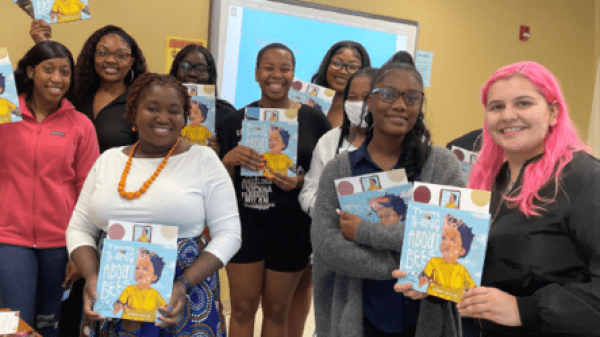
Q&A with Joe Heimlich. Director of Research at COSI Center for Research and Evaluation and Dr. Cheron H. Davis, Associate Professor of Reading Education at Florida A&M University
What drew you to becoming a partner in ee360+?
I was approached by two ee360+ Partners, the University of Florida and Project Learning Tree (PLT), about integrating PLT into our teacher preparation curriculum with pre-service teachers. Oftentimes, folks who aren't STEM run from that, but as a lover of all things science, a girl who loves the outdoors, and an avid gardener who loves to make things grow, I ran to it!
My specialty is reading. Reading is in every facet across content areas. I believe reading is deeply embedded in STEM because you can't learn anything else unless you learn to comprehend it. So, I embraced the idea of bringing PLT training to our pre-service teachers and met with Dr. Edith Davis, who is our Science Methods Instructor, about how to integrate PLT into my Reading Methods course, Teaching Reading & Diagnosing Its Growth. The purpose of this course is to instruct teacher candidates on how to design a developmental reading program in the elementary school curriculum.
ECO-READ
The PLT trainers trained my pre-service teachers, and then the pre-service teachers went out into the field and introduced children to environmental education and hands-on science methods by integrating books and targeted literature into the lessons. The project evolved, and we began to use pre- and post-surveys at the beginning and the end of the semester to gauge [their] pre-service teachers’ self-efficacy in integrating reading and environmental education into an interdisciplinary pedagogical approach. We looked at their ability to merge reading methods and environmental education and how it empowered them to effectively integrate both of these methods. The outcome is what I like to call ECO-READ, Empowering Conservation Through Observation, Reading, Education, Application, and Discovery. I think of it as this holistic, transformational project that's transforming it into STREAM education with an R for reading and an A for art. If you do not include those, you are missing the mark.
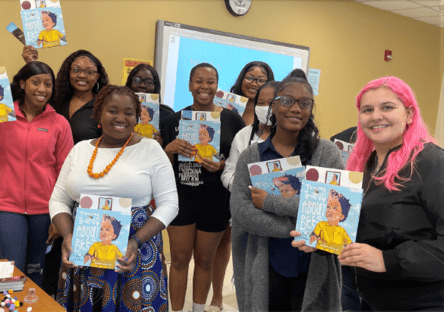
Literature is the foundation of FAMU Professor Dr. Cheron Davis’s ECO-Read (acronym) Program. Photo credit: Dr. Cheron Davis
How has this program been received?
When the pre-service teachers initially came into this, I had to pull them into it. They are young adults living in Florida. They are not excited about coming outside, especially during the winter months when it’s just a bit cooler. They resisted. Then they got there, and they were like, this is so fun. The pre-service teachers feel more comfortable implementing environmental education in their literacy lessons after the PLT training and they wish we had more training from PLT.
One of our students who had gone through a previous semester’s training walked past during a recent PLT training, and she said, “Oh, you guys are doing Project Learning Tree? I love that training. I'm using that in my in my classroom now.”
The teachers, the kids, and the administrators enjoyed it. My students were very appreciative of this.
Why is this project important?
One example that stands out is when pre-service teachers asked their students to draw trees. One of them drew a triangle for a tree, possibly because the only trees they've seen are Christmas trees. After reflecting on it, our pre-service teachers said that it helped them understand that some of these students don't have exposure to the scope of variety in the environment, whether because of their socioeconomic status or because of their urban settings.
PLT is helping them understand the importance of giving students exposure to the environment and recognizing how important environmental education and environmental literacy are for students. They may not know what recycling is and how important it is or that items are recyclable because it is not emphasized in their home environments.
I tell my students, you are the first in line to cultivate an environmentally literate generation of children as a teacher. Passing on the baton of how important they are as teachers in creating this generation of environmentally conscious children who enjoy reading. It gives me a sense of pride knowing that they understand how important their role is in environmental literacy, because some of them aren't necessarily tapped into how important it is. Once they tap into that, they ensure that their students are aware of the great responsibility and power in conservation and taking care of the Earth.
Are there any other stories or accomplishments that you’d like to share from this past year?
This project has exceeded my wildest expectations. I am extremely grateful for people believing in this, because my pre-service teachers and the students they serve deserve to have these opportunities. Many STEM doors and opportunities are closed to Black and Brown scholars.
FAMU is a Historically Black College and University (HBCU) in southern Florida. HBCU culture is like no other. It is a family, it is life, it is affirming. It lifts up, it is spiritual but it is also important to speak to how important these institutions are as a whole. I'm fortunate and thankful that we are now seeing this reemergence of their highlighting what they mean to students, and what they mean to our country. They are not just for Black students. These institutions were created at a time when Black students had no other options for attending institutions of higher education. They are for everyone, and I wish more people understood that particularly now, when there's so many concerted efforts to shut that down and to close that critical piece of our history, and to block that.
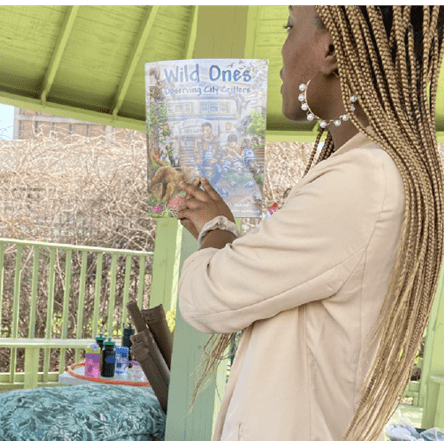
FAMU preservice teacher at a PLT training with a picture book. Photo credit: Dr. Cheron Davis
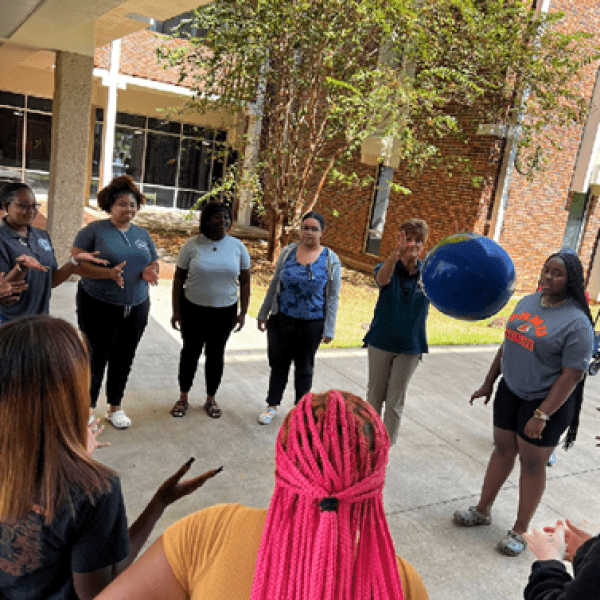
FAMU preservice teachers engaged in PLT training activities. Photo credit: Dr. Cheron Davis
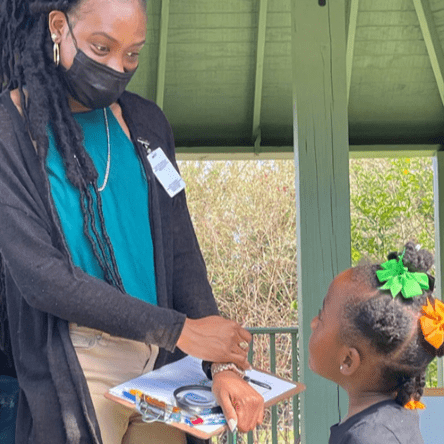
Preservice teacher sharing EE and literacy with a young student during field clinical experiences. Photo credit: Dr. Cheron Davis
What do you hope is this project’s legacy?
I hope that this project is transformational in dispelling the myth that teacher schedules need to be defined by subjects, and instead highlights that their schedules are defined by learning opportunities. Reading is foundational. It's foundational to everything we do. Bringing PLT and environmental education concepts into the classroom has been a gift. I hope that this project is the springboard for merging the foundational belief that every student deserves access to high-quality literacy instruction and equitable, inclusive environmental education. While a literate society opens doors to innovation and social equity and allows its citizens to participate actively in governance, without environmental education, we risk leaving future generations a planet in crisis, threatening the future sustainability of our society. I am deeply grateful to be a part of this incredible project, as it is just one of many small initiatives that ripples outward to create lasting change.
This eePRO blog series, Ripple Effect, highlights stories of collaboration and impact among partners in the ee360+ Leadership and Training Collaborative. ee360+ is an ambitious multi-year initiative that connects, trains, and promotes innovative leaders dedicated to using the power of education to create a more healthy and sustainable future for everyone, everywhere. Led by NAAEE, ee360+ is made possible through funding and support from U.S. EPA and twenty-five partner organizations representing universities and nonprofits across the country, as well as five federal agencies. Through this partnership, ee360+ brings together more than five decades of expertise to grow and strengthen the environmental education field.